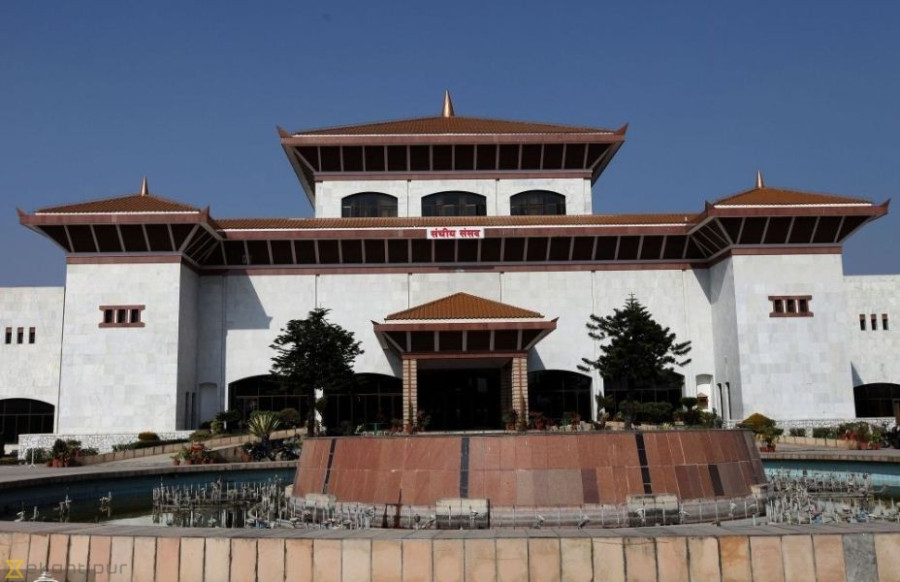Politics
Controversial bills set to flare up tensions at House
At least half a dozen bills, brought up without proper discussions with the stakeholders, have courted controversy over their contents, leading to protests from stakeholders and civil society
Tika R Pradhan
At least half a dozen controversial bills which are registered at the Parliament Secretariat is expected to create tension in Parliament as both the government and the opposition are adamant on their stance.
The government has refused to withdraw the controversial bills which were brought up at the two houses of federal parliament. There are public concerns that those bills were brought up without proper discussions with the stakeholders—a crucial part of making laws in a democratic system. Parliament also seems unconcerned about holding discussions with the stakeholders.
“We don’t hold formal discussions regarding the bills registered at Parliament. Our role is to move the bill ahead as per the regular process once they are registered,” said Deputy Speaker Shiva Maya Tumbahamphe. “All the bills would be moved forward after the discussions on budget is over,” she added. Secretary of the House of Representatives Gopal Nath Yogi said the secretariat is planning to conclude the discussions on budget by June 25.
At least half a dozen bills, brought up without proper discussions with the stakeholders, have courted controversy over their contents, leading to protests from stakeholders and civil society.
Registered at the Parliament Secretariat, the bills are now the property of the federal parliament. With the government refusing to withdraw them, it is up to the speaker of the House of Representatives and the chairman of the National Assembly to decide on ways to take them forward.
Earlier, the government had bulldozed the Medical Council Bill on the back of its numerical strength at the House despite the protest from the opposition.
After widespread criticism from various sections of society and amid continuous street protests, Chairman of the National Assembly Ganesh Timilsina held a discussion with representatives of different parties on May 26 to decide on ways to deal with the Media Council Bill.
During the meeting, Nepali Congress leader Surendra Pandey and leader of Rastriya Janata Party-Nepal Brikhesh Chandra Lal, among others, had urged the Minister for Communication and Information Technology Gokul Banskota to withdraw the bill and come up with necessary amendments. After the meeting failed to make any headway, Timilsina had told the lawmakers that he would hold another discussion soon.
Amid the stalemate between the government and the opposition, the controversial bills would certainly invite tension in Parliament.
“We won’t let the government table the controversial bills in Parliament at any cost,” said Pande, Congress’ Parliamentary Party leader in the National Assembly.
The Media Council Bill and bill to integrate and amend the law on Guthi are two of the most controversial bills currently lying at the Secretariat of the National Assembly.
With the provision to acquire the land of trusts by their caretakers, the bill on Guthi has courted controversy as all the stakeholders are protesting it.
The registered bills will be forwarded to the House in a few weeks when the National Assembly get over with the ongoing discussions on the budget.
Of the 31 bills landed at the Lower House, the bills on National Human Rights Commission, Security Council, peace and security and education, among others, have drawn controversy.
On the last day of its second phase of struggle against the Media Council Bill, the Federation of Nepali Journalists staged a human chain from Baneswor to Babarmahal on Saturday.
The federation had launched the struggle on May 12, demanding the withdrawal of the controversial bill. Various civil society members and organisations have also criticised the provisions of the bill, saying that they were intended at muzzling the media and freedom of expression in the country.
Lawmakers have claimed that the government’s controversial move—bringing up one controversial bill after another—would not only create tension inside Parliament but also in the streets as the agitating stakeholders would not keep silent.
“The bills won’t be implemented even if they are endorsed,” said lawmaker Pandey, warning, “The controversial Acts breaching the constitutional provisions would be challenged at the constitutional bench of the Supreme Court.”




 21.12°C Kathmandu
21.12°C Kathmandu















